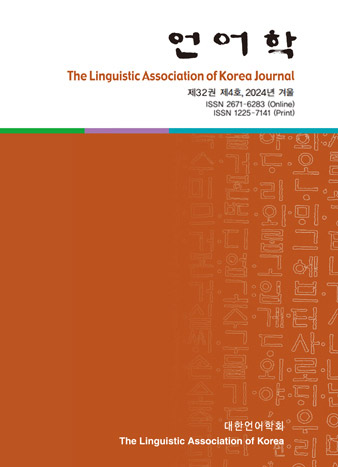대한언어학회 전자저널
32권 4호 (2024년 12월)
- 개방적 과업 수행이 초등영어 학습자의 말하기 및 정의적 영역에 미치는 영향
-
이혜정 · 엄철주
Pages : 25-49
Abstract
Yi, Hechong & Uhm, Chul Joo. (2024). Effects of open-task-based performance on English speaking and the affective domain in elementary English education. The Linguistic Association of Korea Journal, 32(4), 25-49. This study aimed to examine the effects of open-task-based performance on English speaking skills and the affective domain in elementary English education. The classes included activities such as list-making, song lyric modification, role-playing, and group collaboration tasks. Data for analysis were collected through pre- and post-speaking evaluations, questionnaires, self-evaluation sheets, and additional questionnaires. The findings indicated that open-task-based language performance improved learners speaking abilities and enhanced their confidence, particularly in the affective domain. Moreover, the learners perceived task-based instruction as beneficial in improving their English speaking proficiency, with collaboration among group members identified as the most important factor in completing the tasks. Based on these results, it is recommended that, to effectively implement task-based language teaching in elementary English education, various language-integrated tasks with low cognitive load should be applied, along with efforts to promote the generalization of this approach.
Keywords
# 개방적 과업 수행(open-task based performance) # 말하기 능력 (speaking ability) # 인지적 부담(cognitive load) # 학습자 주도(student- directed) # 협력(collaboration)
References
- 교육부. (2022). 영어과 교육과정. 교육부 고시 제 2022-33호[별책 2]. 서울: 교육부.
- 김진영. (2011). 초등학교 영어 수업에서 개방형 과업의 구안과 적용. 미출간 석사학위 논문. 청주교육대학교 교육대학원, 청주, 충북.
- 김진영. (2018). 과업의 인지적 부담과 영어 학습: 과업과 학습자 특성이 말하기 학습에 미치는 영향. 미출간 박사학위논문. 한국교원대학교 대학원, 청주, 충북.
- 박찬진, 김정렬. (2018). 과업 집중 분석법을 통한 우수 초등영어 수업의 과업 조건 분 석. 교원교육, 34(1), 121-142.
- 이승민. (2003). 초등학교 학생들의 과업에 근거한 영어 의사소통 능력 측정모형개발과 적용. 미출간 박사학위논문. 한국교원대학교 대학원, 청주, 충북.
- 이승민, 김진영. (2010). 초등학교 영어 수업에서 개방형 과업의 구안과 적용. 한국중원 언어학회, (18), 173-195.
- 이승민, 김진영. (2022). 협력 활동에서 수준별 모둠 구성이 상호 작용과 영어 학습에 미치는 영향. 초등영어교육, 28(3), 55-78.
- 이지은. (2011). 과제 중심 영어 학습에서 과제 준비 시간과 교수가 초등학생 말하기에 미치는 영향. 미출간 박사학위논문. 한국교원대학교 대학원, 청주, 충북.
- 임유리. (2017). 과업중심교수법이 초등영어 학습자의 영어 학습동기와 영어 음성언어 능력에 미치는 영향. 미출간 석사학위논문. 중앙대학교 교육대학원, 서울.
- 정효준. (2019). 초등영어 말하기 수업-자기 평가 연계를 위한 교수⋅학습 모형 개발 및 적용. 미출간 박사학위논문. 한국교원대학교 대학원, 청주, 충북.
- Breen, M. P. (1987). Learner contributions to task design. In C. N. Chandlin & D. F. Murphy (Eds.), Language learning tasks (Lancaster Practical Papers in English Language Education, Vol, 7) (pp. 23-46). Englewood Cliffs, NJ: Prentice-Hall.
- Breen, M. P., & Candlin, C. N. (1980). The essentials of a communicative curriculum in language teaching. Applied Linguistics, 1(2), 89-112.
- Brindley, G. (1987). Factors affecting task difficulty. In Nunan, D. (Ed.), Guidelines for the development of curriculum resources (pp. 45-56). Adelaide National Curriculum Resource Centre.
- Bygate, M. (1987). Speaking. Oxford: Oxford University Press.
- Ellis, R. (2003). Task-based language learning and teaching. Oxford: Oxford University Press.
- Ellis, R. (2005). Principles of instructed language learning. System, 33(2), 209-224.
- Johnson, K. (1994). The emerging beliefs and instructional practices of preservice English as a second language teachers. Teaching and Teacher Education, 10, 439-452.
- Krashen, S. D. (1985). The input hypothesis: Issues and implications. London: Longman.
- Long, M. H. (1985). A role for instruction in second language acquisition: Task-based language teaching. In K. Hyltenstam & M. Pienemann (Eds.), Modeling and assessing second language development (pp. 77-99). Clevedon, UK: Multilingual Matters.
- Numrich, C. (1996). On becoming a language teacher: Insights from diary studies. TESOL Quarterly, 30(1), 131-153.
- Nunan, D. (1989). Designing tasks for the communicative classroom. Cambridge, UK: Cambridge University Press.
- Nunan, D. (1991). Communicative tasks and the language classroom. TESOL Quarterly, 25(2), 279-295.
- Prabhu, N. S. (1987). Second language pedagogy. Oxford: Oxford University Press.
- Robinson, P. (2001). Task complexity, task difficulty, and task production: Exploring interactions in a componential framework. Applied Linguistics, 22(1), 27-57.
- Samuda, V., & Bygate, M. (2008). Tasks in second language learning. New York: Palgrave Macmillan.
- Skehan, P. (1996). A framework for the implementation of task-based instruction. Applied Linguistics, 17(1), 38-62.
- Skehan, P. (1998). Task-based instruction. Annual Review of Applied Linguistics, 18, 268-286.
- Van den Branden, K. (2006). Training teachers: Task-based as well? In K. Van den Branden (Ed), Task-based language education: From theory to practice (pp. 217-248). Cambridge, U.K: Cambridge University Press.
- Vygotsky, L. S. (1978). Mind in society: The development of higher psychological processes. Cambridge, MA: Harvard University Press.
- Willis, J. (1996). A framework for task-based learning. London: Longman.
- Willis, D., & Willis, J. (2007). Doing task-based teaching. Oxford, UK: Oxford University Press.
